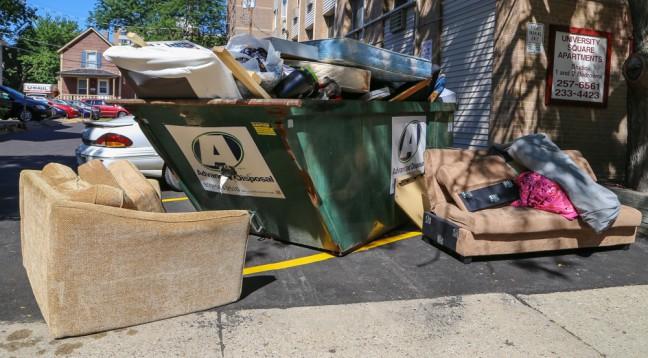The city of Madison is working to produce zero waste in Madison by 2050 by maximizing recycling efforts.
The city’s Solid Waste Advisory Committee convened Thursday to make edits to the original “zero waste” plan, created in 2012.
Thursday’s agenda, created by SWAC, explained the reasoning behind the plan. Space in Dane County landfills is scarce and the cost of building a new landfill is too expensive. SWAC members believe moving toward zero waste production is the city’s most financially feasible option.
When SWAC says “zero waste,” they don’t mean there will be no waste in Madison whatsoever. This simply means all recyclables will be separated from the rest of the garbage so there is no excess waste.
Bryan Johnson, a SWAC member and street division recycling coordinator, said at this point, the major components of the plan, such as recycling and more stringent separation of garbage, have been outlined.
Some committee members, however, were skeptical of the plan’s future success.
Dan Melton, another SWAC member, believes there’s only one thing standing in the way of the successful implementation of the solid waste plan.
“The biggest obstacle between us and the zero waste plan is dog and cat poop,” Melton said.
Separation of waste is an environmentally conscious act that processes garbage into specific categories. This allows for proper storage and handling. When recyclables are separated from waste, it encourages a zero waste city.
Melton said the improper separation of animal waste from the rest of the garbage is an ongoing problem. When these are not separated on a daily basis it creates more waste since they will not be separated from each other at the plant. Many of the committee members agreed.
Jacki Lawton, an embassy from the Board of Public Works, said another problem is the health and safety of employees when working with waste products. Lawton said there needs to be a plan to ensure the cleanliness of the employees who would be separating the waste.
Health and waste separation will require coordination with the city and community, Johnson said. He explained it is especially important to work with the Department of Parks and Recreation, as they host SWAC meetings.
To move forward, Johnson said it is now only a matter of tidying up the language of the plan and making sure SWAC’s goals stay the same in the future. Johnson said it is important to improve communication with the public as well. He said social media will be effective in expressing the goals of the solid waste plan to the public.
“Social media is where the eyeballs are, and it’s where [the SWAC committee] should be too,” Johnson said.
Overall, SWAC is satisfied with the progression of the zero waste plan and anticipates developing it further as time goes on.


